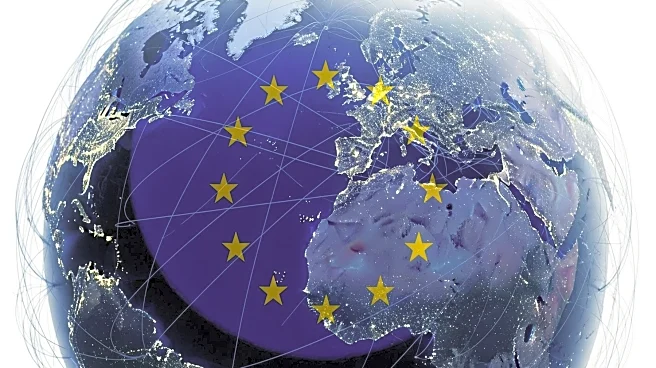What's Happening?
The European Union has introduced a new set of sanctions aimed at Russia's energy sector, intensifying efforts to weaken Moscow's capacity to continue its military actions in Ukraine. The sanctions include
a ban on LNG imports from Russia starting in 2027 and a full transaction ban on major Russian oil companies, Rosneft PJSC and Gazprom Neft PJSC. Additionally, the EU has sanctioned 117 vessels associated with Russia's 'shadow fleet,' which have been used to circumvent previous sanctions. The measures also extend to prohibiting reinsurance for Russian aircraft and vessels, and impose transaction bans on Russian banks and electronic payment systems, as well as third-country banks in Belarus and Kazakhstan. This move follows similar actions by the US and UK, which have also targeted Russian oil giants Rosneft and Lukoil PJSC.
Why It's Important?
These sanctions represent a significant escalation in the economic pressure being applied to Russia by Western allies. By targeting key components of Russia's energy infrastructure, the EU aims to disrupt the financial resources that support Russia's military operations in Ukraine. The sanctions are expected to have a substantial impact on the Russian economy, as they restrict access to international markets and financial systems. The inclusion of Chinese companies in the sanctions list has also drawn a strong response from China, indicating potential diplomatic tensions. The measures are part of a broader strategy to isolate Russia economically and politically, while encouraging other nations to join in the sanctions effort.
What's Next?
The EU's latest sanctions package is likely to provoke further responses from Russia and its allies. Russia may seek alternative markets and financial systems to mitigate the impact of these sanctions. Meanwhile, the EU and its allies will continue to monitor the effectiveness of the sanctions and may consider additional measures if necessary. The situation remains dynamic, with potential implications for global energy markets and international relations. The call for a ceasefire by President Trump and Ukrainian President Volodymyr Zelenskiy suggests diplomatic efforts may continue alongside economic sanctions.
Beyond the Headlines
The sanctions also highlight the growing use of economic tools in international diplomacy and conflict resolution. The targeting of crypto-assets and electronic payment systems reflects an understanding of the evolving nature of financial transactions and the need to address new forms of economic activity. The involvement of Chinese companies in the sanctions list underscores the global interconnectedness of supply chains and the potential for broader geopolitical ramifications. As the situation develops, the effectiveness of these sanctions in achieving their intended goals will be closely scrutinized.










